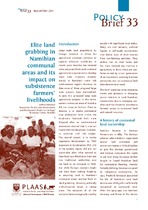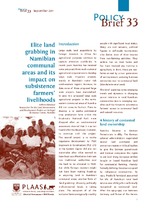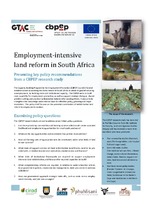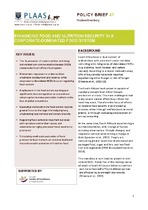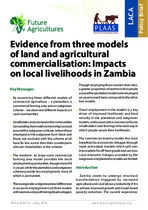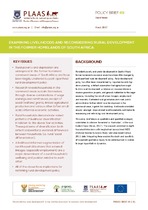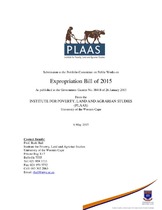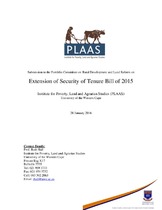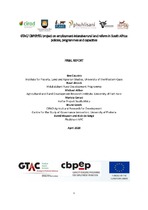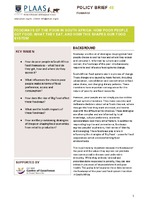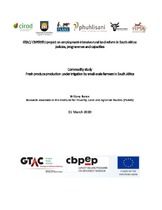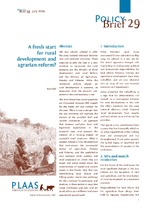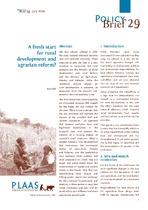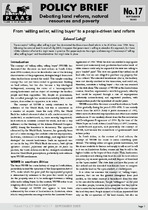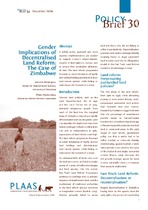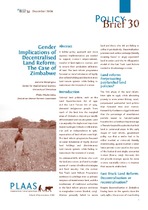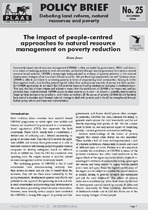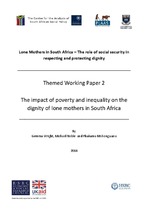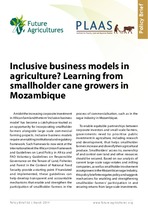Browsing Policy Briefs by Title
Now showing items 26-45 of 144
-
Elite land grabbing in Namibian communal areas and its impact on subsistence farmers’ livelihoods
(PLAAS, University of the Western Cape, 2011)This brief examines some emerging trends and dynamics in changing power relations in rural Namibian communities due to emerging new elites and the threats to subsistence farmers’ access to communal land and ... -
Elite land grabbing in Namibian communal areas and its impact on subsistence farmers’ livelihoods
(Institute for Poverty, Land and Agrarian Studies, University of the Western Cape, 2011)Large scale land acquisitions by foreign investors in Africa for agricultural purposes continue to capture attention worldwide. In recent years Namibia has received some proposals from multi-national agricultural ... -
Employment-intensive land reform in South Africa
(GTAC, 2020)The Capacity Building Programme for Employment Promotion (CBPEP) is an EU-funded initiative aimed at assisting the Government of South Africa to attain its goal of reducing unemployment, by building state and institutional ... -
Enhancing food and nutrition security in a corporate-dominated food system
(Institute for Poverty, Land and Agrarian Studies, University of the Western Cape, 2017)South Africa faces a ‘dual burden’ of malnutrition, with persistent under-nutrition coinciding with rising rates of diet-related NCDs (e.g. diabetes, heart disease, and certain cancers). According to a recent national ... -
Evidence from three models of land and agricultural commercialisation: Impacts on local livelihoods in Zambia
(Institute for Poverty, Land and Agrarian Studies, University of the Western Cape, 2016)Zambia needs to undergo structural transformation triggered by increased agricultural and rural labour productivity if it is to achieve improved growth and broad-based poverty reduction. The current experience, however, ... -
Evidence from three models of land and agricultural commercialization: Impacts on local livelihoods in Zambia
(Institute for Poverty Land and Agrarian Studies (PLAAS), 2016)The approach favoured by most donors is to stimulate growth in smallholder agriculture by a variety of interventions ranging from production technology to market development. Some, however, contend that agricultural ... -
Examining livelihoods and reconsidering rural development in the former homelands of South Africa
(Institute for Poverty, Land and Agrarian Studies, University of the Western Cape, 2017)Persistent poverty and under-development in South Africa’s former homeland communal areas have been little changed by post-apartheid ‘rural development’ policy. Rural development policy has often been characterised by ... -
Expropriation Bill of 2015
(Institute for Poverty, Land and Agrarian Studies, University of the Western Cape, 2015)The Institute for Poverty, Land and Agrarian Studies (PLAAS) is a constituent unit of the School of Government at the University of the Western Cape. PLAAS engages in research, training, policy development and advocacy ... -
Extension of Security of Tenure Bill of 2015
(Institute for Poverty, Land and Agrarian Studies, University of the Western Cape, 2016)The Institute for Poverty, Land and Agrarian Studies (PLAAS) welcomes the initiative to amend the Extension of Security of Tenure Act, 62 of 1997. PLAAS is a constituent unit of the School of Government at the University ... -
Final Report
(GTAC, 2020-03-31)This study focuses on the potential contribution of redistributive land reform to employment creation. Can land redistribution be undertaken in a manner that also creates jobs, and if so, through which types of land use ... -
Foodways of the poor in South Africa: How poor people get food, what they eat, and how this shapes our food system
(Institute for Poverty, Land and Agrarian Studies, University of the Western Cape, 2017)Foodways are the set of strategies shaping what food people choose as well as how and where they access and consume it. Informed by culture and social context, the foodways of the poor simultaneously respond to and ... -
Fresh produce production under irrigation by small-scale farmers in South Africa
(GTAC, 2020-03-31)This report documents the status of fresh produce production under irrigation by small-scale farmers2 in South Africa and investigates the potential for expanding current levels of production, with an emphasis on land ... -
A fresh start for rural development and agrarian reform?
(Institute for Poverty, Land and Agrarian Studies, University of the Western Cape, 2009)The commons (or common-pool resources)1 are the most important resources in southern Africa. The livelihoods of the majority and economies of most countries depend on them. Although common property regimes are often ... -
A fresh start for rural development and agrarian reform?
(PLAAS, University of the Western Cape, 2009-07-29)The new cabinet ushered in after the 2009 national elections features new and renamed ministries. Those expected to take the lead in a new initiative to resuscitate the rural economy are the Ministry of Rural Development ... -
From ‘willing seller, willing buyer’ to a people-driven land reform
(Institute for Poverty, Land and Agrarian Studies, University of the Western Cape, 2005)The concept of ‘willing seller, willing buyer’ has dominated the discourse on land reform in South Africa since 1994. Now, following the national Land Summit of July 2005, it appears that government is willing to abandon ... -
Gender implications of decentralised land reform: The case of Zimbabwe
(Institute for Poverty, Land and Agrarian Studies, University of the Western Cape, 2009)A bolder policy approach and more vigorous implementation are needed to support women’s empowerment, transfer of land rights to women, and to ensure their productive utilisation of land. The land reform programme focussed ... -
Gender implications of decentralised land reform: The case of Zimbabwe
(PLAAS, University of the Western Cape, 2009-12)A bolder policy approach and more vigorous implementation are needed to support women’s empowerment, transfer of land rights to women, and to ensure their productive utilisation of land. The land reform programme focussed ... -
The impact of people-centred approaches to natural resource management on poverty reduction
(Institute for Poverty, Land and Agrarian Studies, University of the Western Cape, 2006)Community-based natural resource management (CBNRM) is often promoted by governments, NGOs and donors as a means of reducing poverty in rural communities, particularly through income-generation from various natural res ... -
The impact of poverty and inequality on the dignity of lone mothers in South Africa
(Institute for Poverty, Land and Agrarian Studies, University of the Western Cape, 2014)The purpose of this themed working paper is to explore lone mothers’ accounts of what dignity means in the context of their lives and how the experience of poverty and inequality impacts on their sense of dignity. This ... -
Inclusive business models in agriculture? Learning from smallholder cane growers in Mozambique
(Institute for Poverty, Land and Agrarian Studies, University of the Western Cape, 2014)Amidst the increasing corporate investment in African farmland the term ‘inclusive business model’ has become a catchphrase touted as an opportunity for incorporating smallholder farmers alongside large-scale commercial ...

